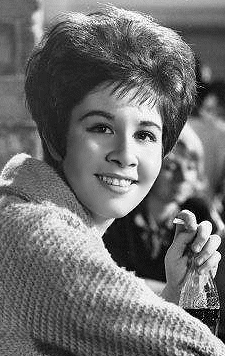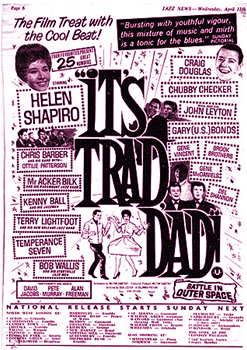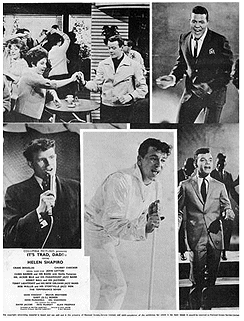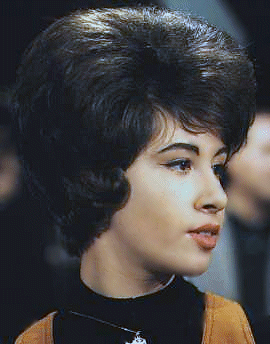Sixties
City presents
a wide-ranging series of
articles on all aspects of the Sixties, penned by the creator of the iconic
60s music paper Mersey
Beat
|
Sixties
City presents
a wide-ranging series of
articles on all aspects of the Sixties, penned by the creator of the iconic
60s music paper Mersey
Beat
|
|||||
|
 |
A 78 minute black and white Amicus/Columbia Pictures film released in
1962 starring Craig Douglas and Helen Shapiro (who was only 15 at the
time), directed by Richard Lester; produced and with a screenplay by Milton
Subotsky. It was released in America under the name ‘Ring A Ding Rhythm’.
Producer Subotsky had originally made the movie ‘Rock Rock Rock’ in 1956
and moved to Britain in 1960 with his business partner Max Rosenberg.
The two formed a company called Amicus Films and ‘It’s Trad, Dad’ was
their first production. Subotsky decided to virtually re-package ‘Rock Rock Rock’ in an English setting with the current British musical trend, Traditional Jazz. Subotsky had seen Dick Lester’s Oscar nominated ‘The Running, Jumping and Standing Still Film’ and also his 30-minute pilot short ‘Have Jazz, Will Travel.’ Subotsky had a tradition of giving a chance to first-time directors and offered Lester the opportunity of directing his first feature film. When Subotsky gave him the script, Lester thought it was the synopsis. He recalled, "Subotsky sent me a 24-page script and I said ‘I think I can do something with it’ - it was with pop-stars, with Gene Vincent and Helen Shapiro and a lot of Trad bands, so I said, ‘I've been around this kind of music all my life. I think I know how to deal with it as soon as you get a first draft screenplay I'd be delighted to read it.’ He said, ‘That's the shooting script and you start in three weeks.’ I said, ‘But it's only 24 pages long’ but he said, ‘You'll find a way to pad it out.’ “So we gathered these poor pop people with this feast of moveable sets behind them and shot them three a day. At the end of the last week of shooting, the Twist started - Chubby Checker and his first big Twist success. So I said to Milton "I think it would be a great idea. We could be the first film in history to have the twist in it. He's in New York. I could go over and shoot him." And he said "If you pay your own way you can go." So I did and we got him in the film, and that was one of the contributing factors to getting ‘A Hard Day's Night’." ‘It’s Trad, Dad’ was filmed in three weeks at a cost of £50,000 and Lester did travel to New York at his own expense to film Chubby Checker although, due to the rush-release of ‘Twist Around The Clock’, he didn’t produce the first film to introduce The Twist, as he’d intended. To an extent, Lester was also able to choose which performers he’d like to include in the film and says, “To my utter shame, I rejected George Melly, because he never sang in tune. Not that the others did, but George was even more noticeable”. The brief plot revolved around Craig (Craig Douglas) and Helen (Helen Shapiro), who are among the young residents of “a New Town which must remain nameless” who enjoy listening to Trad Jazz on the jukebox of a local coffee shop. The town Mayor (Felix Felton), together with his councillors, decides to ban the use of the jukebox as he believes it has a harmful effect on teenagers. The two youngsters decide that they mustn’t allow their favourite music to be banished and decide to prove its popularity by organising a rock and jazz concert. |
 |

|
They
visit a radio station, engaging the help of a disc jockey. When the Mayor
hears about the concert he decides to try and prevent it happening and finds
a way to block the coach carrying the disc jockey and entertainers with
the use of a series of traps, even having the police erect a road block.
Craig and Helen manage to fill the gap until the coach finally gets through
by presenting some of the local talent. Seeing how much the youngsters are
enjoying the music, the adults grudgingly accept that they were wrong. Liverpool actor Derek Guyler, who was to appear in ‘A Hard Day’s Night’ was the narrator. Trad jazz (in Dixieland style), had received a surge of interest in Britain, but it was soon to die down. If the film had concentrated on the jazz artists it would rapidly have become dated, however, a number of popular music acts were included as well as American rock and R&B artists among the 26 musical numbers featured in the film. The jazz groups were Chris Barber’s Jazz Band, with Ottilie Patterson (performing ‘Down By the Riverside’ and ‘When the Saints Go Marching in’), Acker Bilk & His Paramount Jazz Band (performing ‘Frankie & Johnny’), the Temperence Seven (with ‘Everybody Loves My Baby’ and Let’s Have A Dream) and the Dukes of Dixieland, Kenny Ball & his Jazzmen, Bob Wallis & his Storyville Jazzmen and Terry Lightfoot and his New Orleans Jazz Band (There Is A Tavern In The Town). The British pop artists were Helen Shapiro (‘Let’s Talk About Love’,‘Sometime Yesterday'), Craig Douglas ('Rainbows’, ‘Ring-A-Ding Day’), John Leyton ('Lonely City'), the Brook Brothers ('Double Trouble') and Sounds Incorporated (backing Gene Vincent). The American artists included Del Shannon ('She Never Talked About Me'), Chubby Checker (‘Lose Your Inhibition Twist’), Gary U.S. Bonds ('Seven Day Weekend'), Gene Vincent (‘Spaceship To Mars’), Gene McDaniels ('Another Tear Falls'), the Paris Sisters: Albeth, Priscilla, Sherrell, ('What Am I To Do?’). Three British disc jockeys were also featured – Pete Murray, Alan Freeman and David Jacobs, although they are portrayed as rather egotistical people, which was part of Lester’s parody of the current musical scene. He was also satirising the attitude of adults to young people and said, “I prefer the social attitudes of the young people to the disapproval of their parents. If you deal with a subject then you have to take sides somewhere so I’ve chosen the side which I have the most sympathy for”. Lester also introduced a lot of humour into the film. The narrator announced, “These are the recording studios, barred to all except highly skilled technical staff” and suddenly Helen and Craig make their way into the studio with a tea trolley. Another time they try to enter the studio and an officious jobsworth (Hugh Lloyd) obstructs them. Craig then turns to the camera and says, “Can’t you do something about this character?” and a hand appears with a custard pie and plants it in the doorman’s face. |
 |
|
Article
Text
UK
web hosting by
|